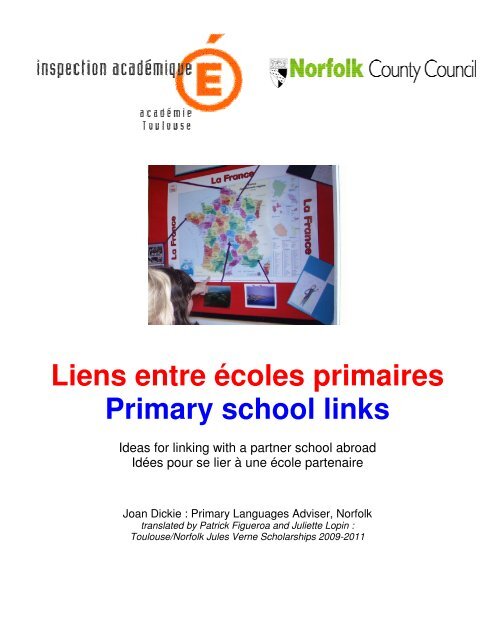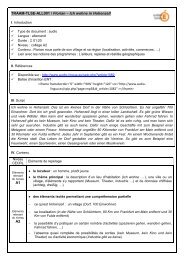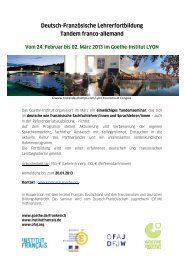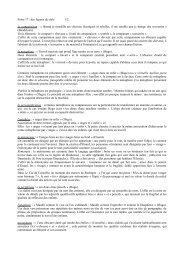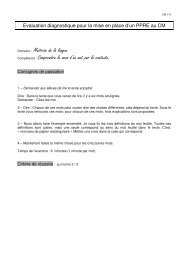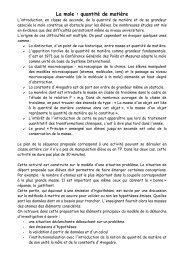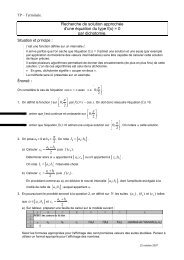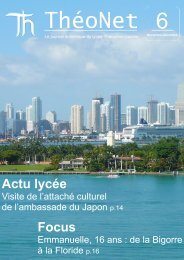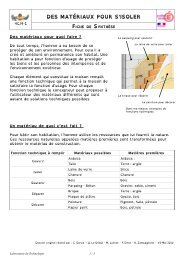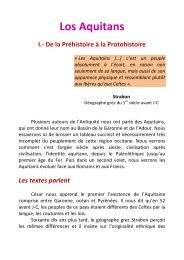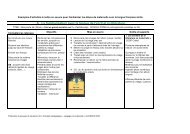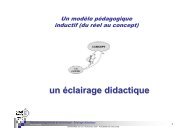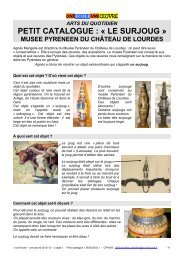Liens entre écoles primaires Primary school links - Académie de ...
Liens entre écoles primaires Primary school links - Académie de ...
Liens entre écoles primaires Primary school links - Académie de ...
You also want an ePaper? Increase the reach of your titles
YUMPU automatically turns print PDFs into web optimized ePapers that Google loves.
<strong>Liens</strong> <strong>entre</strong> <strong>écoles</strong> <strong>primaires</strong><br />
<strong>Primary</strong> <strong>school</strong> <strong>links</strong><br />
I<strong>de</strong>as for linking with a partner <strong>school</strong> abroad<br />
Idées pour se lier à une école partenaire<br />
Joan Dickie : <strong>Primary</strong> Languages Adviser, Norfolk<br />
translated by Patrick Figueroa and Juliette Lopin :<br />
Toulouse/Norfolk Jules Verne Scholarships 2009-2011
Page 3:<br />
Introduction: Making the first <strong>links</strong><br />
Introduction : Premiers liens<br />
In<strong>de</strong>x<br />
Page 4/5<br />
Developing a partnership: Sending letters by post<br />
Développer un partenariat: Envois postaux<br />
Page 6/7<br />
The first year: i<strong>de</strong>as for spreading ‘letter based’ exchanges over a year<br />
La première année: Idées pour programmer vos envois sur l’année<br />
Page 8<br />
Links with other curriculum areas<br />
<strong>Liens</strong> avec d’autre domaines du programme<br />
Page 9<br />
Email exchanges<br />
Echanges <strong>de</strong> mails<br />
Page 10<br />
Vi<strong>de</strong>o Conferencing<br />
Visioconférences<br />
Page 11<br />
Comenius projects : Exchanges and meetings<br />
Projets Comenius: Echanges et rencontres<br />
Page 12<br />
I<strong>de</strong>as for a week of job shadowing in a French <strong>school</strong><br />
Organiser sa semaine <strong>de</strong> job-shadowing dans une école anglaise<br />
Page 13<br />
French <strong>school</strong> organisation<br />
L’organisation <strong>de</strong>s <strong>écoles</strong> anglaises<br />
Page 14/16 : Appendix / Annexe<br />
A: Useful phrases to begin! / Phrases utiles pour commencer<br />
B: I<strong>de</strong>as from Toulouse / Norfolk partnerships / Idées du partenariat Norfolk /Toulouse<br />
2
Introduction: First <strong>links</strong><br />
1. Finding a Link <strong>school</strong><br />
Experience shows that<br />
some of the longest<br />
lasting partnerships are<br />
ma<strong>de</strong> through personal<br />
contacts.<br />
If your county or town is<br />
linked with partner area,<br />
contact the linking<br />
organiser to see if they<br />
can find a partner <strong>school</strong> for<br />
you.www.globalgateway.co.uk has a database of<br />
<strong>school</strong>s looking for partners, worldwi<strong>de</strong>.<br />
2.Contacts between teachers.<br />
Once your <strong>school</strong>s are linked, the next step is for<br />
teachers to make contact between themselves<br />
and can be established in many ways: letters,<br />
email, photos...even facebook! A great way to<br />
begin is to learn a little more about each other’s<br />
<strong>school</strong>s, regions and curriculum for the year. If<br />
your French is not too strong; don’t worry: it<br />
should be absolutely fine for you to write/ phone<br />
in English. This way you can either translate<br />
yourself or use an on-line translator<br />
3.Creating a project notice board:<br />
A good i<strong>de</strong>a is to create a special space in the<br />
classroom for project materials: photos, drawings,<br />
maps of the area, town or village, so that pupils<br />
can look at it in their own time. A <strong>de</strong>dicated<br />
project page on your internet site would be a<br />
good i<strong>de</strong>a to <strong>de</strong>velop over time.<br />
4.Using ICT and E security<br />
Teachers will find that strong ICT knowledge will<br />
be very helpful in continuing this type of project<br />
and they will be able to use whatever they feel is<br />
most suitable to communicate between<br />
themselves, from emails to blogs. Teachers must<br />
obviously remain vigilant about all areas of Esecurity<br />
Introduction : Premiers liens<br />
1. Trouver une école partenaire<br />
L’expérience démontre que les<br />
partenariats qui durent le plus<br />
longtemps sont ceux initiés à partir <strong>de</strong><br />
contacts personnels.<br />
Si votre académie ou votre ville est liée<br />
à une région partenaire, contactez les<br />
CPL afin <strong>de</strong> savoir s’ils peuvent vous<br />
trouver une école partenaire. De même,<br />
www.globalgateway.co.uk dispose<br />
d’une liste d’<strong>écoles</strong> qui, à travers le mon<strong>de</strong>,<br />
recherchent <strong>de</strong>s partenaires.<br />
2. <strong>Liens</strong> <strong>entre</strong> professeurs<br />
Une fois que vous avez une école partenaire, la<br />
première chose à faire est <strong>de</strong> prendre contact<br />
avec votre homologue anglais, que ce soit par<br />
courrier, email, photo… ou même facebook!<br />
Essayez d’en apprendre un peu plus sur vos<br />
<strong>écoles</strong> respectives, vos régions et vos<br />
progressions sur l’année dans les différents<br />
domaines. Si votre anglais est un peu faible, pas<br />
d’inquiétu<strong>de</strong>. Vous pouvez tout à fait commencer<br />
par écrire ou téléphoner en français ou vous ai<strong>de</strong>r<br />
<strong>de</strong> traducteurs en ligne.<br />
3. Un espace dédié au projet :<br />
En classe, un espace dédié à ce projet peut être<br />
aménagé (affiches, photos, <strong>de</strong>ssins, cartes <strong>de</strong> la<br />
région, plan du village/<strong>de</strong> la ville, vocabulaire, ...)<br />
pour que les élèves puissent s'y référer<br />
régulièrement. Par ailleurs, consacrer un site ou<br />
une page du site <strong>de</strong> votre école au projet serait<br />
très utile à long terme.<br />
4. L'outil informatique et Sécurité:<br />
Une bon niveau <strong>de</strong> maîtrise <strong>de</strong>s différents outils<br />
informatiques sera un atout majeur pour mener<br />
au mieux ce projet et diversifier les supports<br />
d’échanges (envoi <strong>de</strong> fichiers, création et mise à<br />
jour <strong>de</strong> site ou <strong>de</strong> blog, e-twinning,..)<br />
Il vous faudra être particulièrement vigilant quant<br />
à la sécurisation <strong>de</strong>s échanges <strong>entre</strong> enfants sur<br />
le Net. Si vous avez <strong>de</strong>s questions ou besoin <strong>de</strong><br />
support, n’hésitez pas à contacter le responsable<br />
TICE <strong>de</strong> votre circonscription.<br />
3
Developing a partnership<br />
Sending by post:<br />
o Sending and receiving by post is still a<br />
<strong>de</strong>lightful beginning to a partnership.<br />
Children love to receive hand written<br />
messages and letters (a rarity these<br />
days!)<br />
o It is extremely worthwhile to discuss the<br />
content of a year’s worth of letter<br />
exchanges in advance with your partner<br />
teacher so that this becomes a planned<br />
part of your year’s lessons (possibly tied<br />
in with literacy planning).<br />
o Remember that some exchanges could be<br />
from the whole class or from small groups<br />
especially if class numbers are different.<br />
o It is also worthwhile discussing the whole<br />
exchange with pupils. Watch this film clip<br />
of an English KS2 class preparing to write<br />
their first letter.<br />
http://www.primarylanguages.org.uk/training_z<br />
one/teachers/using_the_ks2_framework/interc<br />
ultural_un<strong>de</strong>rstanding/penfriend_letter.aspx<br />
o Try and draw out the following points from<br />
a discussion with pupils so they feel<br />
involved in the exchanges from the<br />
beginning:<br />
Write to a <strong>school</strong> address and do<br />
not give out home addresses.<br />
It is much easier to read a foreign<br />
language than write it! So<br />
consi<strong>de</strong>r sending the first letters in<br />
English and receive in French<br />
that the class can work out,<br />
perhaps using dictionaries and<br />
then they can use words of<br />
phrases learnt in their next letters.<br />
Alternatively write half a letter in<br />
French and half in English.<br />
Développer un partenariat<br />
Envois postaux :<br />
o Envoyer et recevoir du courrier par la poste<br />
reste un formidable moyen d'entamer un<br />
projet <strong>de</strong> partenariat. Les enfants adorent<br />
recevoir <strong>de</strong>s lettres manuscrites (chose <strong>de</strong><br />
plus en plus rare aujourd'hui!).<br />
o Il sera utile <strong>de</strong> discuter à l'avance avec<br />
l’enseignant partenaire du contenu <strong>de</strong><br />
l’ensemble <strong>de</strong> vos échanges afin <strong>de</strong> les<br />
inclurent dans vos programmations<br />
annuelles en anglais ou dans les autres<br />
domaines (Production d'écrit, Littérature,<br />
mathématiques).<br />
o Souvenez-vous que certains échanges<br />
peuvent provenir <strong>de</strong> la classe entière ou<br />
juste d’un petit groupe, en particulier si le<br />
nombre d'élèves est différent.<br />
o Il est également intéressant <strong>de</strong> discuter du<br />
contenu <strong>de</strong> vos échanges avec vos élèves.<br />
Regar<strong>de</strong>z ce film d’une classe anglaise <strong>de</strong><br />
CM1/2 préparant leur première lettre.<br />
http://www.primarylanguages.org.uk/training<br />
_zone/teachers/using_the_ks2_framework/i<br />
ntercultural_un<strong>de</strong>rstanding/penfriend_letter.<br />
aspx<br />
o Essayez <strong>de</strong> faire ressortir les points<br />
suivants à partir d'une discussion avec les<br />
élèves afin qu'ils se sentent impliqués dès<br />
le début:<br />
Ecrire à l'adresse <strong>de</strong> l'école et ne<br />
pas donner les adresses<br />
personnelles.<br />
Il est beaucoup plus facile <strong>de</strong> lire<br />
une langue étrangère que <strong>de</strong><br />
l'écrire. Alors pensez à envoyer les<br />
premières lettres en français et à<br />
en recevoir en anglais. Utilisez<br />
alors <strong>de</strong>s dictionnaires ou <strong>de</strong>s mots<br />
et <strong>de</strong>s phrases apprises pour leurs<br />
prochaines lettres. Sinon écrivez la<br />
moitié en français et l'autre en<br />
anglais.<br />
4
o Their audience are also beginners at English<br />
(like your class is at French) so any content<br />
must be simple and short!<br />
o Try not to get embroiled in conversations with<br />
pupils on ‘how do you say ...in French?’ Let<br />
children only write what they know well and<br />
write other i<strong>de</strong>as in their own language …<br />
keeping it simple for their receiving audience<br />
to translate<br />
o Aim for uniformity of content to begin with: It is<br />
easier for a teacher to help the class<br />
un<strong>de</strong>rstand new letters in a foreign language<br />
if the 25 to 30 letters sent and received have<br />
a similar content and are not all different.<br />
o Don’t let pupils write everything they know in<br />
the first letter!<br />
o Christmas and Easter or any other typical<br />
celebrations are great ‘inter cultural<br />
un<strong>de</strong>rstanding ‘opportunities to tell the other<br />
class about. Send cards and<br />
greetings that are typical so<br />
they can learn more about<br />
your country/culture and you<br />
about theirs.<br />
o Pupils will like to receive drawings and<br />
photographs, or self portraits if photos are a<br />
problem.<br />
o You could send information by post in a<br />
variety of ways e.g. a PowerPoint of pictures,<br />
a photo of an art display, a short film of an<br />
assembly, a booklet, a recording or a song on<br />
disk etc. If your receiving <strong>school</strong> has the IT<br />
capability then of course many can go as<br />
attachments.<br />
o A written exchange could be an opportunity to<br />
reinforce literacy messages e.g. letter layout,<br />
handwriting, formal and informal language,<br />
using language appropriate for an audience<br />
etc.<br />
5<br />
o Les élèves sont également débutants en<br />
français (comme votre classe l’est en<br />
anglais)... Donc le contenu doit être simple et<br />
court!<br />
o Essayez <strong>de</strong> ne pas vous embourber dans <strong>de</strong>s<br />
discutions avec les élèves sur "comment dire<br />
... .. en anglais?" Laissez les enfants écrire ce<br />
qu'ils connaissent bien et écrire les autres<br />
idées dans leur propre langue ... Faites simple<br />
pour faciliter la traduction aux <strong>de</strong>stinataires.<br />
o En premier lieu, veillez à l’uniformité du<br />
contenu: Il sera plus facile pour l’enseignant<br />
d’ai<strong>de</strong>r à saisir le sens <strong>de</strong> lettres écrites dans<br />
une langue étrangère, si les 25 à 30 lettres<br />
envoyées/reçues ont un contenu similaire et<br />
ne sont pas toutes différentes.<br />
o Ne laissez pas les élèves écrire tout ce qu'ils<br />
savent dès la première lettre!<br />
o Noël, Pâques ou autres célébrations<br />
typiques sont <strong>de</strong>s opportunités<br />
d’«ouvertures interculturelles » à<br />
partager avec l'autre classe.<br />
Envoyez <strong>de</strong>s cartes <strong>de</strong> vœux<br />
typiques pour qu'ils puissent en<br />
apprendre plus sur votre pays/culture et vous<br />
sur les leurs.<br />
o Les élèves apprécieront <strong>de</strong> recevoir <strong>de</strong>s<br />
<strong>de</strong>ssins, <strong>de</strong>s photos, ou <strong>de</strong>s autoportraits si les<br />
photos sont un problème.<br />
o Vous pourrez diversifier le contenu <strong>de</strong> vos<br />
envois courrier <strong>de</strong> multiples façons: en<br />
envoyant un Powerpoint <strong>de</strong> photos, une photo<br />
d'une exposition d'art, la vidéo d'un spectacle,<br />
un livret, un enregistrement ou un CD <strong>de</strong><br />
chansons, etc. Si votre école partenaire a les<br />
moyens informatiques cela peut bien sûr être<br />
envoyé en pièces jointes.<br />
o Un envoi peut être prétexte à l'étu<strong>de</strong> d'un type<br />
d'écrit. Ex: mise en page d'une lettre, écriture,<br />
langage formel et informel, en utilisant un<br />
langage approprié pour un public, rédaction<br />
d’instructions, etc.
La première<br />
année<br />
The first year<br />
Sept<br />
England sends<br />
France receives<br />
L’Angleterre envoit<br />
La France reçoit<br />
Oct<br />
England receives<br />
France sends<br />
L’Angleterre reçoit<br />
La France envoit<br />
Nov<br />
England sends<br />
France receives<br />
L’Angleterre envoit<br />
La France reçoit<br />
Dec<br />
Both <strong>school</strong>s<br />
send and receive<br />
Les <strong>de</strong>ux <strong>écoles</strong><br />
envoient et<br />
reçoivent<br />
I<strong>de</strong>as for planning exchanges over<br />
<strong>school</strong> a year<br />
o This planning is quite ambitious… you<br />
may want to choose a smaller number<br />
of exchanges.<br />
o Why not replace an exchange with a<br />
vi<strong>de</strong>o conference!<br />
Idées pour programmer vos envois sur<br />
l’année<br />
o Cette programmation est assez<br />
ambitieuse… N’hésitez pas à réduire le<br />
nombre d’échanges.<br />
o Pourquoi ne pas remplacer un échange par<br />
une visioconférence ?...<br />
School A ( England ) Ecole B (France)<br />
1.The English <strong>school</strong> writes<br />
short letters/cards in a combination of<br />
English and a small amount of French<br />
with greetings, name, age and drawing or<br />
photo.<br />
...could be individual or group letters<br />
The French <strong>school</strong> receives your letters in<br />
English .They will reply with their name<br />
and age in English (copying phrases<br />
from English letters) and then add in<br />
French where they live and if they have<br />
any pets.( + picture/photo?)<br />
3. The English <strong>school</strong> could send<br />
back labelled drawings about Bonfire<br />
Night explaining all the colours they could<br />
see ...some colours could be in French if<br />
they know them and others in English:<br />
good for the French class to practise their<br />
colours in English…add drawings?.<br />
4. Both <strong>school</strong>s send Christmas<br />
cards/advent calendars etc. in their own<br />
language for class to receive something<br />
culturally typical. Perhaps send a set of<br />
crackers (little known on the<br />
continent)…Perhaps exchange music and<br />
recording of a favourite carol in own<br />
language for other <strong>school</strong> to learn.<br />
L’école française attend les premières lettres<br />
d’Angleterre.<br />
Les Anglais <strong>de</strong>vraient envoyer <strong>de</strong>s<br />
cartes/lettres courtes, présentant les élèves.<br />
Elles seront écrites en anglais, avec un peu<br />
<strong>de</strong> français et pourront être collectives ou<br />
individuelles.<br />
2. Vous répon<strong>de</strong>z aux lettres reçues<br />
Dites bonjour avec le nom et l'âge en anglais<br />
(phrases copiées sur les lettres <strong>de</strong>s Anglais),<br />
puis ajoutez en français où vivent les élèves<br />
et s’ils ont <strong>de</strong>s animaux <strong>de</strong> compagnie.<br />
(+ Image / photo?)<br />
Vous recevez <strong>de</strong>s lettres d’Angleterre :<br />
Le 5 novembre les Anglais commémorent<br />
l’attentat manqué contre le parlement <strong>de</strong><br />
Westminster, c’est Bonefire Night.<br />
Aussi recevrez-vous peut être <strong>de</strong>s <strong>de</strong>ssins<br />
légendés au sujet <strong>de</strong>s feux d'artifice qui ont<br />
lieu ce soir là… Ainsi Anglais et Français<br />
pourront apprendre ou réviser les couleurs.<br />
C’est aussi pour vous l’occasion <strong>de</strong> faire un<br />
point sur la civilisation britannique.<br />
4. Les <strong>de</strong>ux <strong>écoles</strong> peuvent s'envoyer<br />
<strong>de</strong>s cartes <strong>de</strong> Noël/calendriers <strong>de</strong> l'Avent, etc.<br />
dans leur propre langue pour que chacun<br />
reçoive quelque chose <strong>de</strong> culturellement<br />
authentique. Vous pourriez aussi échanger <strong>de</strong><br />
la musique et envoyer un enregistrement <strong>de</strong><br />
vos élèves interprétant un chant <strong>de</strong> Noël<br />
traditionnel français pour que votre école<br />
partenaire l’apprenne.<br />
6
Jan<br />
England receives<br />
France sends<br />
L’Angleterre reçoit<br />
La France envoit<br />
Fe/Mar<br />
Both <strong>school</strong>s<br />
send and receive<br />
Les <strong>de</strong>ux <strong>écoles</strong><br />
envoient et<br />
reçoivent<br />
April<br />
England sends<br />
France receives<br />
L’Angleterre envoit<br />
La France reçoit<br />
May<br />
England receives<br />
France sends<br />
L’Angleterre reçoit<br />
La France envoit<br />
June/Juin<br />
Both <strong>school</strong>s<br />
have a picnic!<br />
Les 2 <strong>écoles</strong> font<br />
un pique-nique!<br />
July/Juillet<br />
French <strong>school</strong> replies (to Bonfire letter)<br />
with a fête <strong>de</strong>s rois / carnival explanation<br />
in French/English about typical<br />
traditions/food. They could send you a<br />
recipe or instructions to create an object!<br />
6. Send /make a pop up Easter card<br />
and explain about Easter eggs.<br />
Write in English with a few French<br />
phrases eg ‘J’adore le chocolat...et toi?’<br />
7. The English <strong>school</strong> could send photos<br />
of the <strong>school</strong>/village…maybe as a class<br />
Powerpoint /PhotoStory with children’s<br />
voices. ‘ Salut! Bienvenue dans notre<br />
école! Here is the <strong>school</strong>. This is our<br />
headteacher Mr Brown. ‘<br />
5. Vous répon<strong>de</strong>z aux lettres sur les<br />
feux d’artifice par une lettre présentant à votre<br />
tour <strong>de</strong>s traditions françaises du début<br />
d’année : fête <strong>de</strong>s rois, préparation du<br />
carnaval. Ecrivez en français et en anglais,<br />
proposez recettes et fiches techniques<br />
d’objets à réaliser à l’occasion <strong>de</strong> ces fêtes.<br />
6. Envoyez une carte <strong>de</strong> Pâques et<br />
expliquez les traditions autour <strong>de</strong> cette fête et<br />
du poisson d’avril.<br />
Ecrire en français ainsi que quelques<br />
phrases en anglais, par exemple :<br />
«I like chocolate ...do you ?»<br />
L’école anglaise envoie <strong>de</strong>s photos <strong>de</strong><br />
l'école/du village ... peut-être sous forme d’un<br />
document Powerpoint/Photostory avec <strong>de</strong>s<br />
voix d'enfants présentant leur établissement :<br />
«Salut! Bienvenue dans notre école! Here is the<br />
<strong>school</strong>. This is our headteacher Mr Brown.”<br />
See Appendix A for more i<strong>de</strong>as ! Aussi : voir Appendix A<br />
L’école française répond avec <strong>de</strong>s détails sur<br />
son école / village. Si vous en avez la<br />
possibilité essayez vous aussi d’envoyer films,<br />
Powerpoints, ou Didapages pour que les<br />
élèves anglais aient l’opportunité d’entendre<br />
leurs correspondants parler français mais<br />
aussi motiver les vôtres à s’appliquer dans<br />
leur prononciation.<br />
and baguette?<br />
Cucumber<br />
sandwiches or brie<br />
Extra i<strong>de</strong>a! Have a class picnic with<br />
French food and French outdoor<br />
games with recipes and instructions sent<br />
to you by your partner…and of course<br />
send your i<strong>de</strong>as to them. (Thanks to<br />
Rudham <strong>Primary</strong> for this i<strong>de</strong>a!)<br />
Teachers plan for next year.<br />
Schools on the continent are usually on<br />
holiday by now!<br />
Sandwiches au<br />
concombre ou<br />
brie et baguette?<br />
Organisez un pique-nique <strong>de</strong> classe avec <strong>de</strong><br />
la nourriture anglaise et <strong>de</strong>s jeux<br />
typiquement anglais à l’ai<strong>de</strong> <strong>de</strong> recettes et<br />
d’instructions envoyées par votre partenaire ...<br />
et bien sûr, envoyer les vôtres pour qu’ils<br />
réalisent le leur.<br />
(Merci à l'école primaire <strong>de</strong> Rudham pour cette idée!)<br />
Les enseignants planifient les échanges pour<br />
l'année prochaine.<br />
Notez que les <strong>écoles</strong> anglaises ne sont pas<br />
en vacances avant la fin juillet !<br />
7
Links involving<br />
other curriculum areas<br />
In future exchanges you could<br />
introduce a greater variety of<br />
curriculum areas. Many of<br />
these can be sent in English<br />
for your French partners to read<br />
and translate e.g.<br />
Science: A labeled drawing following a<br />
vocabulary theme<br />
Geography: A map/plan of the<br />
classroom/bedroom /house/<strong>school</strong><br />
environment/ local area<br />
History: Description of a famous person<br />
/historical or cultural event (e.g. bonfire<br />
night)<br />
English: Recount of an experience, a trip, a<br />
meeting<br />
Technology: Recipe or instructions for a DT<br />
project<br />
Make a class newspaper in English for<br />
your partner class with appropriate:<br />
i. short articles<br />
ii. cartoons<br />
iii. riddles<br />
iv. jokes<br />
v. puzzles<br />
vi. crosswords<br />
vii. adverts etc<br />
<strong>Liens</strong> avec d'autres domaines du<br />
programme<br />
D'autres domaines du<br />
programme peuvent être<br />
abordés grâce à cette<br />
correspondance. Certains<br />
projets pourront être envoyés<br />
en français pour que vos<br />
partenaires les lisent et les traduisent.<br />
Sciences : Réaliser un schéma légendé,<br />
utiliser un vocabulaire thématique<br />
Découverte du mon<strong>de</strong> : Réaliser le plan <strong>de</strong> la<br />
classe, <strong>de</strong> sa chambre, <strong>de</strong> l'école, du quartier,<br />
<strong>de</strong> son village,…<br />
Histoire : Présenter un personnage célèbre,<br />
un événement historique, populaire ou culturel<br />
Français : Rédiger un compte rendu<br />
d'expérience, <strong>de</strong> visite, <strong>de</strong> voyage, <strong>de</strong><br />
rencontre.<br />
Transdisciplinaire : Proposer une recette <strong>de</strong><br />
cuisine ou fiche <strong>de</strong> montage d'un objet réalisé<br />
en classe.<br />
Créer un journal <strong>de</strong> classe en français<br />
pour vos correspondants:<br />
i. articles<br />
ii. <strong>de</strong>ssins humoristiques<br />
iii. <strong>de</strong>vinettes<br />
iv. blagues<br />
v. énigmes/ rébus<br />
vi. mots croisés<br />
vii. publicités etc.<br />
8
Email exchanges<br />
All the postal activities can also be sent<br />
electronically. A big advantage will be the<br />
possibility of adding multi-media elements<br />
such as:<br />
Photos: countrysi<strong>de</strong>, buildings, roads,<br />
important people (portraits), scanned<br />
drawings, posters, maps, artistic or sporting<br />
activities<br />
Sound files: songs, pop music, music played<br />
or sung by the class, stories, poetry, noises<br />
from the immediate <strong>school</strong> or village<br />
environment, etc.<br />
Vi<strong>de</strong>os: children introducing themselves, film<br />
of <strong>school</strong>, village, sketches, plays, <strong>school</strong><br />
trips, short films, animation with subtitles etc.<br />
Each exchange could be collective or<br />
individual (pupils may or may not have their<br />
own email address)<br />
There are many exciting i<strong>de</strong>as to accompany<br />
or replace postal exchanges on<br />
http://www.etwinning.net<br />
On this site look in particular at:<br />
The Desktop : your personal protected area<br />
containing all the tools you need to<br />
participate in eTwinning<br />
The TwinSpace: a multilingual tool <strong>de</strong>signed<br />
specifically for eTwinning projects.<br />
Awards: The aim of the European eTwinning<br />
Prizes competition is to highlight best practice<br />
in collaborative <strong>school</strong> projects using<br />
ICT…giving you great i<strong>de</strong>as for a project of<br />
your own!<br />
Echanges <strong>de</strong> mails<br />
Toutes les activités citées précé<strong>de</strong>mment<br />
peuvent aussi être envoyées <strong>de</strong> manière<br />
électronique. L'avantage est <strong>de</strong> pouvoir ajouter<br />
plus facilement et à moindre coût <strong>de</strong>s éléments<br />
multimédias tels que:<br />
Photos: paysages <strong>de</strong> la région, bâtiments,<br />
rues, personnes importantes (portraits),<br />
<strong>de</strong>ssins scannés, affiches, cartes, activités<br />
artistiques ou sportives, créations visuelles<br />
Sons: chansons ; musique populaire ou jouée<br />
par la classe ; histoires ; poésies ; bruits<br />
environnants la classe, l'école, le village ;<br />
reportage audio ; etc.<br />
Vidéos: présentation <strong>de</strong>s élèves, <strong>de</strong> la classe,<br />
<strong>de</strong> l'école, du village (reportage), sketchs,<br />
théâtre, visite d'un lieu ou rencontre, film<br />
d'animation sous-titré etc.<br />
Chaque envoi pourra être collectif ou<br />
individuel (Vous pouvez créer gratuitement une<br />
adresse <strong>de</strong> messagerie pour tous vos élèves sur<br />
http://education.laposte.net)<br />
eTwinning<br />
Il y a beaucoup d'idées passionnantes sur le<br />
site d'eTwinning pour accompagner ou<br />
remplacer les échanges postaux :<br />
http://www.etwinning.net/fr<br />
Sur ce site, regar<strong>de</strong>z en particulier :<br />
Outils du tableau <strong>de</strong> bord: Le tableau <strong>de</strong><br />
bord est votre zone personnelle protégée<br />
comprenant tous les outils dont vous avez<br />
besoin pour participer à eTwinning.<br />
L’espace virtuel : un outil multilingue qui a<br />
été conçu spécialement pour répondre aux<br />
besoins <strong>de</strong>s projets eTwinning.<br />
Les Prix eTwinning européens veulent<br />
souligner les meilleures pratiques <strong>de</strong>s projets<br />
scolaires coopératifs ayant recours aux<br />
Technologies <strong>de</strong> l’information et <strong>de</strong> la<br />
communication… vous pouvez y trouver <strong>de</strong><br />
bonnes idées pour votre propre projet.<br />
9
Vi<strong>de</strong>o conferencing<br />
(more <strong>de</strong>tails: next bilingual booklet!)<br />
Before embarking on vi<strong>de</strong>o conferencing<br />
it is recommen<strong>de</strong>d that teachers become<br />
very familiar with the equipment and<br />
techniques without children present<br />
including:<br />
o teacher training<br />
o trials in the home <strong>school</strong> or between<br />
other English <strong>school</strong>s<br />
o allowing pupils to become familiar with<br />
the expectations of behaviour etc<br />
during a session<br />
In the long term, this method of<br />
communication could be used once a term or<br />
more frequently as <strong>school</strong>s become more<br />
accustomed to it.<br />
I<strong>de</strong>as for VC activities:<br />
Large groups: presentation of a play, a<br />
science experiment, an art exhibition,<br />
followed by questions in both languages,<br />
joining in with a group song or game<br />
Small groups (max 4): conversation,<br />
interview, game (drawing, mime, battleships).<br />
In pairs: conversation, games (e.g. guessing<br />
games, O & X)<br />
Think about creating a bilingual chart with<br />
useful vocabulary for each activity<br />
All these meetings could be opportunities for<br />
assessment and class feedback so that<br />
pupils are encouraged to reflect on what did<br />
and didn’t work and why, leading to<br />
increasingly successful meetings<br />
See the following film clip of monster games,<br />
vi<strong>de</strong>o conferencing activities between English<br />
and French <strong>school</strong>s:<br />
http://www.primarylanguages.org.uk/training_zone/teachers/using_t<br />
he_ks2_framework/intercultural_un<strong>de</strong>rstanding/vi<strong>de</strong>o_link<br />
Visioconférence<br />
(plus <strong>de</strong> détails :prochain document bilingue !)<br />
Avant <strong>de</strong> commencer, vous <strong>de</strong>vez<br />
absolument vous familiariser avec le<br />
matériel et les logiciels <strong>de</strong> visioconférence<br />
afin <strong>de</strong> ne pas être bloqué le jour J par <strong>de</strong>s<br />
difficultés techniques. Ceci implique :<br />
o une formation <strong>de</strong>s professeurs,<br />
o <strong>de</strong>s essais <strong>entre</strong> classes <strong>de</strong> l’école ou<br />
<strong>entre</strong> <strong>écoles</strong> françaises,<br />
o la préparation <strong>de</strong>s élèves (attitu<strong>de</strong>s,<br />
comportement, rôle <strong>de</strong> chacun et<br />
déroulement <strong>de</strong> la séance).<br />
Utilisé épisodiquement au début, ce moyen <strong>de</strong><br />
communication pourra <strong>de</strong>venir, dès que vous<br />
vous sentirez plus à l’aise dans son utilisation,<br />
un outil régulier <strong>de</strong> vos échanges.<br />
Idées d’activités lors <strong>de</strong> visioconférences :<br />
En grand groupe: Présenter un spectacle,<br />
une expérience, <strong>de</strong>s productions d'arts visuels<br />
suivies d'une séance <strong>de</strong> questions/réponses<br />
dans les <strong>de</strong>ux langues, chanson, jeux...<br />
En petits groupe (4 max): conversation,<br />
interview, jeux (<strong>de</strong>ssin, mime, bataille navale).<br />
Par <strong>de</strong>ux: conversation, jeux (<strong>de</strong>vinettes,<br />
morpion,..)<br />
Pensez à proposer ou même à réaliser avec<br />
les élèves, un livret d’ai<strong>de</strong> bilingue pour ces<br />
différentes activités.<br />
Toutes ces rencontres vous donnent<br />
l’opportunité <strong>de</strong> réaliser évaluations formatives<br />
et débats avec la classe afin <strong>de</strong> savoir ce qui a<br />
marché ou pas et pourquoi. Ainsi, la qualité <strong>de</strong><br />
chaque rencontre sera améliorée au fur et à<br />
mesure <strong>de</strong>s expériences vécues.<br />
10<br />
Regar<strong>de</strong>z ce film d’une activité réalisée en<br />
visioconférence <strong>entre</strong> <strong>de</strong>ux <strong>écoles</strong>, anglaise et<br />
française :<br />
(jeu <strong>de</strong> « qui-est-ce ? » avec <strong>de</strong>s monstres)<br />
http://www.primarylanguages.org.uk/training_zone/teachers/using_the_ks2_fr<br />
amework/intercultural_un<strong>de</strong>rstanding/vi<strong>de</strong>o_link
Comenius projects<br />
Exchanges and meetings<br />
The most rewarding language experience is a<br />
visit to the country where the language is<br />
spoken. This could take place in a variety of<br />
ways for teachers, and perhaps for ol<strong>de</strong>r<br />
pupils:<br />
Teacher visits to each others’ <strong>school</strong>s<br />
(job shadowing)<br />
Pupil exchanges in a secure c<strong>entre</strong> ( eg<br />
PGL/ Holt Hall/Hill Top) to join together in<br />
daily and group activities<br />
Group visits to museums, towns etc.<br />
Sporting, artistic or cultural meetings<br />
Comenius projects<br />
You might <strong>de</strong>velop<br />
such a successful<br />
partnership that you want to consi<strong>de</strong>r<br />
expanding to inclu<strong>de</strong> at least one more partner<br />
when you can access European funding for<br />
teacher/pupil visits. We have several Norfolk<br />
<strong>school</strong>s with experience of this and also<br />
leading teachers who could talk to you about<br />
what is involved. Initially see:<br />
http://www.globalgateway.org/<strong>de</strong>fault.aspx?page=1554<br />
Norfolk : some additional <strong>links</strong><br />
International School Award<br />
Any partnership activities would be excellent<br />
evi<strong>de</strong>nce to go towards an International<br />
Schools Award: read more on:<br />
http://www.globalgateway.org<br />
Projet Comenius<br />
Echanges et rencontres<br />
11<br />
Lorsque l’on apprend une langue étrangère, le plus<br />
enrichissant au niveau langagier, culturel et humain<br />
reste <strong>de</strong> se rendre dans un pays où cette langue<br />
est parlée. Cela est réalisable, pour les<br />
professeurs ou même les élèves les plus âgés, <strong>de</strong><br />
différentes façons :<br />
Visite d’école bilatérale <strong>entre</strong> enseignants<br />
partenaires (job shadowing)<br />
Accueil <strong>de</strong> la classe partenaire lors d’un<br />
séjour en c<strong>entre</strong> <strong>de</strong> vacance agréé, PGL... pour<br />
y partager le quotidien et les activités<br />
Visite d’un musée, d’une ville,…<br />
Rencontres sportives, artistiques ou<br />
culturelles<br />
Projet Comenius<br />
Un partenariat couronné <strong>de</strong> succès pourrait vous<br />
donner envie d’en développer d’autres ! Si vous<br />
l’envisagez, vous pouvez accé<strong>de</strong>r aux<br />
financements européens pour la visite <strong>de</strong><br />
professeurs ou d'élèves. Nous avons plusieurs<br />
<strong>écoles</strong> du Norfolk/ Toulouse habituées à ce<br />
protocole ainsi que <strong>de</strong>s enseignants expérimentés<br />
qui pourraient vous en dire plus et vous ai<strong>de</strong>r.<br />
Avant allez voir :<br />
http://www.ac-toulouse.fr/web/1544-formation-continue-<strong>de</strong>spersonnels-educatifs.php<br />
Toulouse : Quelques liens intéressants:<br />
http://www.educnet.education.fr/primaire/1000-visios/<br />
http://pedagogie.acmontpellier.fr/maticevi<strong>de</strong>o/bilan2008/in<strong>de</strong>x.htmhttp://www.ac-toulouse.fr/web/265-salle-<strong>de</strong>presse.php?id=8092
I<strong>de</strong>as for a week of job shadowing<br />
in a French <strong>school</strong><br />
To take as presents:<br />
o A <strong>school</strong> sweatshirt /mug/ tea towel etc.<br />
o Introductory cards from your pupils<br />
o Traditional English sweets / biscuits<br />
o A CD of songs to teach<br />
o Story books to read (rhythmic, repetitive text)<br />
Activities to prepare<br />
o Keep any activities simple but prepare at two or<br />
more levels for KS1 and KS2 ages<br />
o If possible contact your French <strong>school</strong> in<br />
advance and ask what ‘topic areas’ they are<br />
working on in language lessons.<br />
o Prepare some activities linked to this vocabulary<br />
eg songs, action rhymes, a reading book.<br />
o French <strong>school</strong>s may have less technology than<br />
in England so print out some large photos as<br />
well as taking a memory stick<br />
Ask your pupils what they would like to tell the<br />
French class about their <strong>school</strong><br />
o Pupils could take and label photos of their<br />
<strong>school</strong> (you might be surprised what they<br />
choose!)<br />
o Ol<strong>de</strong>r pupils could prepare a film of the <strong>school</strong><br />
day with single word titles and put a backing<br />
track of their <strong>school</strong> song!<br />
Your timetable for the week<br />
o Your French partner <strong>school</strong> should not be<br />
expecting you just to teach English.<br />
o You should have an opportunity to visit other<br />
classes to see many aspects of the curriculum.<br />
o Ask your <strong>school</strong> in advance for a typical week’s<br />
timetable and discuss what you may be doing<br />
Ways to feedback on your return<br />
o Take film or photos (with permission) to<br />
feedback to pupils, colleagues and clusters<br />
o Take a <strong>school</strong> toy / mascot to visit the partner<br />
<strong>school</strong> and take photos ...OR...<br />
A great i<strong>de</strong>a! When in France: buy a<br />
local puppet (or secretly take one with<br />
you!) who you photograph in different<br />
situations. The puppet can write a<br />
postcard back to your class and then<br />
come back with you to <strong>de</strong>scribe what<br />
they’ve been doing...of course they will<br />
only speak French!<br />
François is posting a card to<br />
his new Norfolk <strong>school</strong>!<br />
Organiser sa semaine <strong>de</strong> job-shadowing<br />
dans une école anglaise<br />
Apportez <strong>de</strong>s ca<strong>de</strong>aux:<br />
o Posters, photos, <strong>de</strong> votre école/ville/région<br />
o Cartes où vos élèves se présentent<br />
o Spécialités régionales<br />
o Un CD <strong>de</strong> chansons à apprendre<br />
o Albums simples, à structure répétitive<br />
12<br />
Préparez <strong>de</strong>s activités à proposer :<br />
o Ne prévoyez rien <strong>de</strong> trop compliqué mais préparez<br />
<strong>de</strong>s activités pour tous les cycles.<br />
o Si possible, contactez votre école d’accueil pour<br />
vous renseigner sur ce qu’ils seront en train d’étudier<br />
en français quand vous serez là<br />
o Choisissez chansons, jeux <strong>de</strong> doigts, albums en<br />
fonction du thème qui vous aura été donné<br />
o Les <strong>écoles</strong> anglaises disposent d’un ordinateur et d’un TBI<br />
dans toutes les classes, vous pouvez donc tout emporter<br />
sous format numérique et prévoir <strong>de</strong>s sites internet à leur<br />
montrer.<br />
Deman<strong>de</strong>z à vos élèves ce qu’ils voudraient dire<br />
aux Anglais au sujet <strong>de</strong> leur école<br />
o Les élèves pourraient prendre et légen<strong>de</strong>r <strong>de</strong>s<br />
photos <strong>de</strong> l’école (vous pourriez être surpris par ce<br />
qu’ils choisiront <strong>de</strong> monter!)<br />
o Des élèves plus âgés pourraient réaliser un film<br />
illustrant une journée <strong>de</strong> classe ordinaire, en utilisant<br />
un vocabulaire très simple.<br />
Votre emploi du temps <strong>de</strong> la semaine<br />
o Votre école anglaise ne doit pas s’attendre à ce<br />
que vous n’enseigniez que le français.<br />
o Vous <strong>de</strong>vez pouvoir observer d’autres classes et <strong>de</strong>s<br />
leçons dans différentes disciplines.<br />
o Deman<strong>de</strong>z leur emploi du temps habituel pour<br />
anticiper et discuter <strong>de</strong> vos interventions<br />
Rendre compte <strong>de</strong> votre semaine<br />
o Réalisez films ou photos (avec autorisation) à<br />
montrer à vos élèves, vos collègues,…<br />
o Emportez une mascotte avec vous et prenez la en<br />
photo dans votre école partenaire ...Ou...<br />
Une excellente idée serait d’acheter une<br />
mascotte en Angleterre (ou <strong>de</strong> l’emporter<br />
secrètement avec vous) et <strong>de</strong> la photographier<br />
dans différentes situations. Elle pourrait écrire<br />
une carte à votre classe et revenir avec vous<br />
pour raconter ce qu’elle a fait… bien sûr quelle<br />
que soit votre mascotte, elle ne pourra parler<br />
qu’anglais !
French School Organisation<br />
Compulsory <strong>school</strong>: age 6-16<br />
In France, 12% of children age 2 and almost every child<br />
age 3-5 goes to l’école maternelle.<br />
Le primaire<br />
La maternelle : age 2-6<br />
L’élémentaire: age 6-11<br />
Le secondaire<br />
Le collège : age 11-15<br />
Le lycée: age 15-18<br />
Maternelle: age 2-6<br />
Cycle 1<br />
TPS : Toute petite section age 2-3<br />
PS : Petite section age 3-4<br />
MS : Moyenne section age 4-5<br />
Cycle 2<br />
GS: Gran<strong>de</strong> section age 5-6<br />
Elémentaire: age 6-11<br />
CP:Cours Préparatoire age 6-7<br />
CE1: Cours élémentaire: age 7-8<br />
Cycle 3<br />
CE2: Cours élémentaire : age 8-9<br />
CM1: Cours moyen: age 9-10<br />
CM2 : Cours moyen : age 10-11<br />
Collège<br />
6ème: age 11-12<br />
5ème: age 12-13<br />
4ème: age 13-14<br />
3ème: age 14-15<br />
Diplôme national du brevet<br />
Lycée<br />
2 nd : age 15-16<br />
End of compulsory <strong>school</strong>ing<br />
1ère: age 16-17<br />
Terminale: age 17-18<br />
Baccalauréat<br />
In France to go to university you need to have the baccalauréat (pass<br />
gra<strong>de</strong> is sufficient , year tuition 600€/year)<br />
To go to a “Gran<strong>de</strong> école” (Polytechnique, HEC, ENS,..) you need to<br />
spend 2 years in “Classe préparatoire” to prepare for competitive<br />
exams. The access to “classe préparatoire” is based on prior high<br />
<strong>school</strong> gra<strong>de</strong>s and is a really challenging option requiring the best<br />
gra<strong>de</strong>s:<br />
**In 2002 93.5% of stu<strong>de</strong>nts with a baccalauréat<br />
went on to higher education for at least 1 year.<br />
Organisation <strong>de</strong>s <strong>écoles</strong> anglaises<br />
Ecole obligatoire: <strong>de</strong> 5 à 16ans<br />
Les enfants doivent commencer l’école le trimestre <strong>de</strong> leur<br />
5ème anniversaire ... beaucoup commence en septembre <strong>de</strong><br />
l’année <strong>de</strong> leur 5 ans.<br />
<strong>Primary</strong> School: enfants âgés <strong>de</strong> 4 à 11ans<br />
Elle peut être divisée dans certains endroits en :<br />
Infant School: enfants âgés <strong>de</strong> 5 à 7ans<br />
Junior School: enfants âgés <strong>de</strong> 7 à 11 ans<br />
Secondary School:<br />
enfants âgés <strong>de</strong> 11 à 18ans<br />
Early Years Foundation Stage<br />
Nursery: <strong>de</strong> 0 à 4 ans (non-obligatoire)<br />
Reception: <strong>de</strong> 4 à 5 ans<br />
Key Stage 1<br />
Year1: <strong>de</strong> 5 à 6 ans<br />
Year 2: <strong>de</strong> 6 à 7 ans<br />
Key Stage 2<br />
Year 3: <strong>de</strong> 7 à 8<br />
Year 4: <strong>de</strong> 8 à 9<br />
Year 5: <strong>de</strong> 9 à 10<br />
Year 6: <strong>de</strong> 10 à 11<br />
Key Stage 3<br />
Year 7: <strong>de</strong> 11 à 12<br />
Year 8: <strong>de</strong> 12 à 13<br />
Year 9: <strong>de</strong> 13 à 14<br />
Key Stage 4<br />
Year 10: <strong>de</strong> 14 à 15<br />
Year 11: <strong>de</strong> 15 à 16<br />
GCSE exams (les élèves peuvent passer <strong>de</strong> 6 à 12<br />
matières <strong>de</strong> leur choix)<br />
Fin <strong>de</strong> l’école obligatoire<br />
Sixth Form<br />
Year 12: <strong>de</strong> 16 à 17<br />
Year13: <strong>de</strong> 17 à 18<br />
A level exams:<br />
Notés <strong>de</strong> manière nationale <strong>de</strong> A* à E<br />
Les bonnes universités <strong>de</strong>man<strong>de</strong>nt <strong>de</strong>s notes <strong>entre</strong> A*-B<br />
* en 2010 : 30-40% d’étudiants sont allés a l’université pour 3<br />
ans ou plus.<br />
13
APPENDIX A:<br />
Useful phrases to get started!<br />
Cher (to a boy) Chère ( to a girl)<br />
Je m’appelle Tom<br />
J’ai 9 ans<br />
J’habite dans une ville (un village) qui<br />
s’appelle Yarmouth dans le Norfolk<br />
Mon école s’appelle Everytown <strong>Primary</strong> School<br />
Mon professeur s’appelle Mrs Williams<br />
J’adore les maths et le français!<br />
Le weekend j’aime jouer au foot dans le parc<br />
J’ai un chat qui s’appelle Blackie. As-tu un animal?<br />
Je t’envoie un photo <strong>de</strong> moi avec Blackie<br />
J’attends ton courier avec impatience!<br />
Ton ami, Tom OR Ton amie, Sally<br />
In<strong>de</strong>x A<br />
Phrases utiles pour commencer!<br />
Dear (+ name)<br />
My name is Emilie<br />
I am 9 years old<br />
I live in a town (village) called Foix, near Toulouse<br />
My <strong>school</strong> is called ……………………<br />
My teacher’s name is Mme Leblanc<br />
I really like Maths and English!<br />
At the weekend I like playing football in the park<br />
I have a cat called Minou. Do you have any pets?<br />
I’m sending you a photo of me with Minou<br />
I am looking forward to your next letter.<br />
Love from Guillaume<br />
14
Appendix/In<strong>de</strong>x B:Thank you to Norfolk and Toulouse <strong>school</strong>s for these great PowerPoint sli<strong>de</strong>s !.<br />
Merci aux <strong>écoles</strong> <strong>de</strong> Norfolk et Toulouse pour ces exemplaires <strong>de</strong> PowerPoint !<br />
Holt <strong>Primary</strong> School + Groupe Scolaire Clau<strong>de</strong> Nogaro<br />
The <strong>school</strong>s have written in their own languages, at first, to help teach their partner class<br />
Les <strong>écoles</strong> ont écrit d’abord dans leur propres langues, pour ai<strong>de</strong>r enseigner leur partenaires<br />
We have to wear a<br />
<strong>school</strong> uniform.<br />
I am wearing<br />
my <strong>school</strong><br />
sweatshirt.<br />
Our <strong>school</strong> sweatshirt<br />
has an owl on it. The owl<br />
is the symbol of Holt.<br />
In the corridors.<br />
Our work is<br />
displayed on<br />
the walls.<br />
15
Good luck with your projects!<br />
Bonne chance pour vos projets !<br />
16


